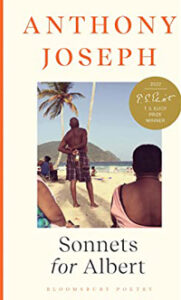I wrote over three years ago about how language is used politically and while the issue never goes away, it has reared its head again in a striking way recently. The matter under discussion was Britain’s immigration policy and in particular the language used by politicians to demonise those refugees who attempt to enter the UK in dangerous small boats, crossing the channel between France and England. For political gain, minority groups have been denigrated and othered by politicians throughout history. That is why it was particularly poignant when Holocaust survivor Joan Salter challenged the Home Secretary, Suella Braverman, about the language she has used. She took particular exception to the word ‘invasion’, with its connotations of hostile forces, attack and forced submission. She explains her concerns here.
 In more uplifting literary news, musician and poet Anthony Joseph has won the TS Eliot Prize for poetry, using and adapting the sonnet form in a book of poems about his absent father. The judges said that the collection ‘celebrates humanity in all its contradictions and breathes new life into this enduring form’. Joseph himself comments ‘Over the years I have realised that being a poet means that you have a particular outlook, a particular way of looking at language and seeing the world in a language-based way’.
In more uplifting literary news, musician and poet Anthony Joseph has won the TS Eliot Prize for poetry, using and adapting the sonnet form in a book of poems about his absent father. The judges said that the collection ‘celebrates humanity in all its contradictions and breathes new life into this enduring form’. Joseph himself comments ‘Over the years I have realised that being a poet means that you have a particular outlook, a particular way of looking at language and seeing the world in a language-based way’.
 Meanwhile, Ayòbámi Adébáyò has published her second novel, A Spell of Good Things, set in early 21st century Nigeria. She writes about the complexity of Nigeria and the challenges it poses to its citizens in an open, clear-sighted way. An international literary star, she could easily leave, but remains largely in the country: ‘I think that Nigeria will always be home. It’s frustrating and complex but I do feel some sort of commitment to the country.’ Read more here.
Meanwhile, Ayòbámi Adébáyò has published her second novel, A Spell of Good Things, set in early 21st century Nigeria. She writes about the complexity of Nigeria and the challenges it poses to its citizens in an open, clear-sighted way. An international literary star, she could easily leave, but remains largely in the country: ‘I think that Nigeria will always be home. It’s frustrating and complex but I do feel some sort of commitment to the country.’ Read more here.